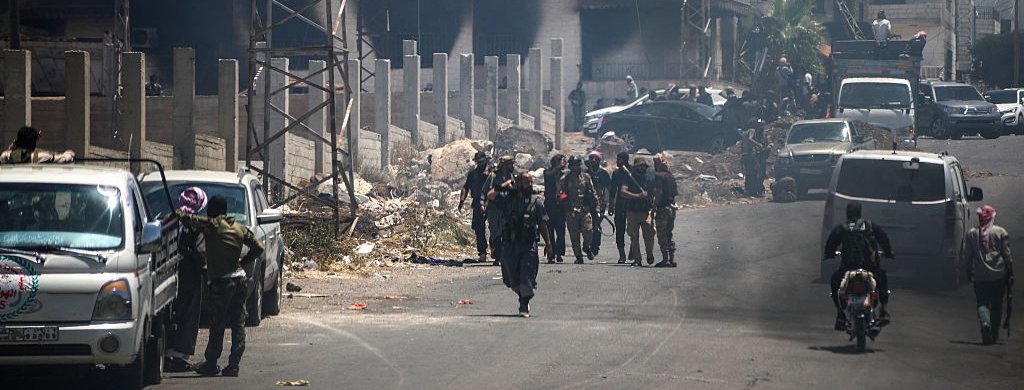- Verified videos and eyewitness testimony reveal 46 Druze men and women deliberately and unlawfully killed
- Extrajudicial executions were carried out by government and government affiliated forces in military and security uniforms, some bearing official insignia
- Executions took place in a public square, residential homes, a school, a hospital and a ceremonial hall in Suwayda governorate
The Syrian government must hold members of government security and military forces and members of affiliated forces accountable for the extrajudicial executions of Druze men and women in Suwayda, said Amnesty International.
The organization has documented compelling new evidence indicating that government and government-affiliated forces were responsible for the extrajudicial executions of Druze people on 15 and 16 July in Suwayda. This includes verified videos of armed men in security and military uniforms, some bearing official insignia, executing unarmed people in homes, a public square, a school, and a hospital. On 31 July, the Ministry of Justice established a committee to investigate violations that occurred in Suwayda and to hold those responsible accountable.
What hurt me the most was seeing my son’s body dance as the bullets [by security forces] pierced him.A father who decided to relocate his family to the countryside
“When government security or military forces deliberately and unlawfully kill someone, or when affiliated forces do so with government complicity or acquiescence, that constitutes an extrajudicial execution, which is a crime under international law. The Syrian government must promptly, independently, impartially and transparently investigate these executions and hold perpetrators accountable in fair proceedings, without recourse to the death penalty,” said Diana Semaan, Amnesty International’s Syria Researcher.
“The horrific human rights violations in Suwayda are yet another grim reminder of the deadly consequences of impunity for sectarian-based killings in Syria, which has emboldened government and affiliated forces to kill without fear of accountability. Following the unlawful killings of hundreds of civilians from the Alawite minority and the continued absence of justice, this violence against members of the Druze minority leaves another community devastated, fuels further unrest, and undermines faith that the government will credibly deliver truth, justice, and reparations for all those in the country that have endured decades of crimes under international law and other serious human right violations.”
Between 11 and 12 July, tensions flared in southern Syria between Druze armed groups and Bedouin tribal fighters, leading to armed clashes. On 15 July, government forces said they had entered Suwayda city to “restore stability” and imposed a curfew. On the same day, Israel carried out air strikes against Syrian military vehicles, killing at least 15 members of government forces. Emerging reports of human rights violations by government and affiliated forces in Suwayda triggered renewed fighting with Druze armed groups, leading to significant escalation of violence, which ended with the withdrawal of government forces late at night on July 16.
Amnesty International documented the deliberate shooting and killing of 46 Druze people (44 men and two women), as well as the mock execution of two older persons on 15 July and 16 July. These executions by government and government-affiliated forces occurred in a public square, residential homes, a school, a hospital and a ceremonial hall in Suwayda governorate.
In the days these extrajudicial executions were committed, armed men in Suwayda directed sectarian slogans at members of the Druze community and subjected religious men to humiliating treatment, such as the forcible shaving of their moustaches, which are culturally significant.
Amnesty International interviewed 13 people in Suwayda and two people from Suwayda living abroad. Among the 15 interviewees, eight had family members who were executed, one of whom witnessed the executions of their family members and another the executions of a group of people firsthand. Five visited separate execution sites and saw their family members’ and other people’s bodies. One woman’s parents were subjected to a mock execution, and two other interviewees were held with their families and threatened at gunpoint while armed men in military uniform searched their home.
The Evidence Lab, Amnesty International’s digital investigations team, verified 22 videos and photos shared with its researchers or posted on social media between 15 July and 10 August and conducted weapons analysis. Amnesty International also collected testimonies from witnesses and family members of those who were executed or whose bodies were visible in the videos. The organization also reviewed photos and videos taken in and around Suwayda between 14 and 17 July 2025 and published by the media in its analysis of the armed actors present in the area.
Amnesty International has also received credible reports of abductions committed by Druze armed groups and Bedouin tribal fighters between 17 and 19 July. The organization is currently investigating these reports.
On 12 August, Amnesty International wrote to the Syrian Ministers of Interior and Defence, sharing its preliminary findings and requesting information on the status of the government’s investigation into the events, including the role of state forces, steps taken to hold perpetrators to account, and the measures taken before, during and in the aftermath of the fighting to protect people from violations and abuses. No response had been received at the time of publication.

